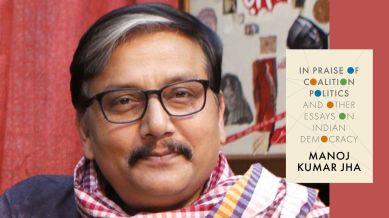RJD MP Manoj Kumar Jha’s new book celebrates dissent and spirit of democracy
It is a curation of his speeches, writings and letters that repeatedly evoke issues that have been shaping contemporary politics -- coalition politics, manual scavenging, the significance of party cadres and the deliberate silencing of Manipur

Exploring the relationship between history and memory, French historian Pierre Nora spoke of “deliberately creating archives”, so that the privileged history doesn’t sweep away the voices of the marginalised. Invocation of both historic and non-historic moments – otherwise not marked, or appropriated – even at the cost of repetition, builds up an archive. Parliamentarian and professor Manoj Kumar Jha’s latest book, In Praise of Coalition Politics and Other Essays in Indian Democracy – an anthology of his speeches, writings and letters – serves this purpose. Through repeated evocation of issues that matter – from coalition politics, the fate of the manual scavengers, the significance of party cadres, to the deliberate silencing of Manipur – these essays are reflections of our time, carefully curated for posterity.
This book is a valuable contribution to the field of history, sociology and political science for three reasons. First, it goes back to the constituent assembly debates and the founding principles of our nation to understand the contemporary lacunae of Indian politics. This tracing back of history to find the actual roots of our modern nation, that is India, stands against any imagination of a timeless, continuous, civilizational past, deterred by the historical aberrations, nowadays peddled as “invasion”.
monthly limit of free stories.
with an Express account.
In the opening essay “In Praise of Coalition Politics” that sets the tone and theme of the anthology, he referred to the debate over the Uniform Civil Code (UCC) and rightly pointed out that despite the differences — the most crucial component of a working democracy — a compromise was reached. The house “acknowledged the concerns of Muslim leaders, who sought to ensure that personal laws – particularly in matters of marriage and inheritance – would not be imposed upon any community that didn’t want them.” Emphasising the historical relevance of coalition politics, Jha showed how the major progressive socio-political transitions — the implementation of the Mandal Commission reports, economic liberalisation, MNREGA — occurred during coalition governments. The pulls of coalition partners, mostly regional parties, restrain the largest constituent from taking unilateral decisions in matters of national importance. This keeps a check on any authoritarian tendency and helps maintain diversity of voices.
Second, Jha’s reimagination of “politics” and “dissent” – words contemptuously used in contemporary India – offers a discursive context to think through the constitutive values of democracy. While talking about the Centre’s narratives on Kashmir’s “normalcy” in contrast to the images of violence that cloud such claims, Jha writes, “The refusal to wear nationalism as dictated is often misread as sedition. But what if dissent is also a form of belonging?” Dissent is both a constitutive and derivative component of democracy. Similarly, it is also part of everyday politics that Jha defines as “the creation of civic spaces where citizens can raise their voices, share their anxieties, demand redress and challenge power.” It echoes the notion of Habermas’s public sphere that shapes the contour of deliberative democracy. During COVID, when the country was reeling under unbearable pain and the deaths became merely numbers, what the people needed was empathetic politics, not the lack of it. Jha rightly argues that the objectivity of numbers can’t obscure the subjectivity of grief.
Third, Jha continues to carry the legacy of parliamentarians like Gurudas Dasgupta, Hirendranath Mukherjee, who minced no words while criticising the government for any policy that stood against the nation’s progress. Mukherjee’s criticism of Congress leadership’s “reactionary revivalism” during the discussions on the Special Marriage Act still echoes in the chambers of the house. Parliamentarians are sent to bring up the issues that have been pushed to footnotes. They seem to be the voices of the silenced majority. Jha’s deliberations on many issues, be it his letter to the Rajya Sabha Chairperson on Manipur or his speech on EWS reservations – documented in these pages — break such silences. Finally, his acknowledgement of “Invisible knapsack of privilege”, so rare among politicians, reflects his social sensibility and nuanced understanding of graded and intersectional inequality.
This anthology, however, could have had a separate essay on the systematic exploitation of Muslims. While the essays on Waqf, inhuman conditions in prisons and letters to Nehru and Gandhi bring in the socio-political marginalisation of Muslims, it connects it to the larger political dynamics, instead of perceiving it as the mode of “governmentality” itself. As the competing ideas of the nation – civic and pluralistic versus cultural and majoritarian – shape our everyday lives, Jha makes us rethink what it means to be Indian. It becomes a memoir of a nation that still struggles to survive its foundational principles.